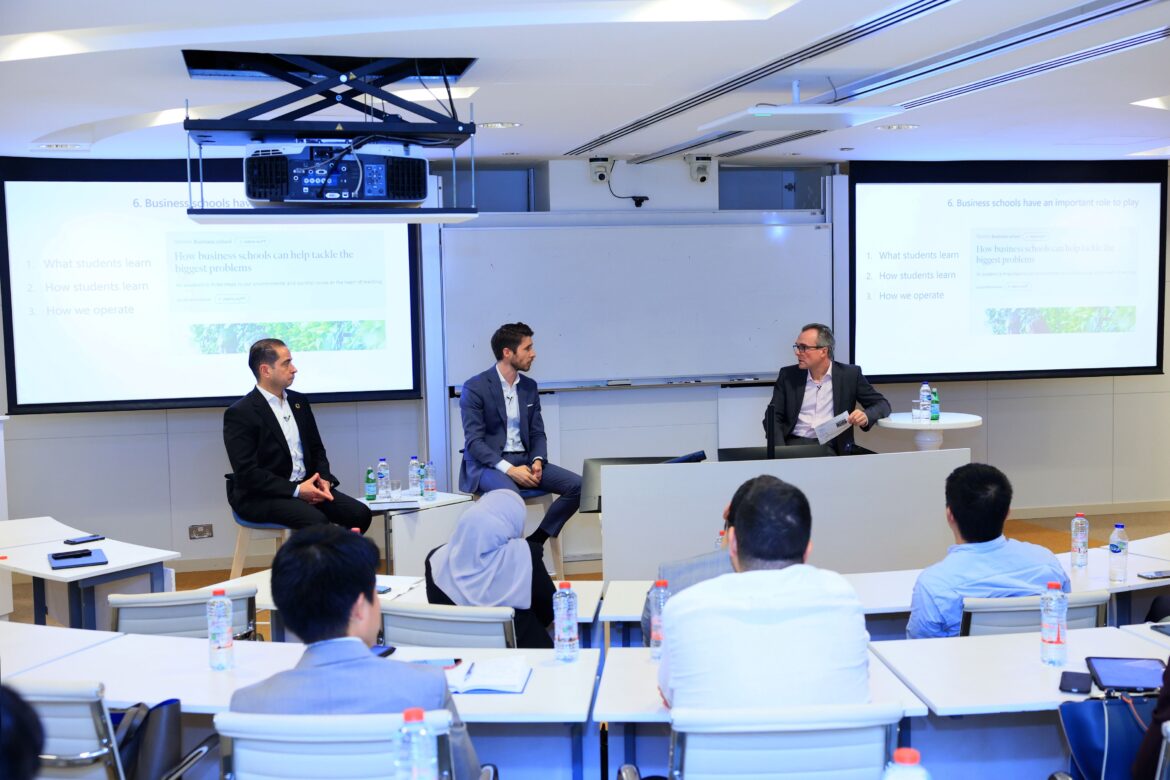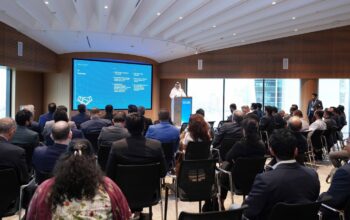Dubai, November 27, 2023 —London Business School (LBS) hosted a roundtable with experts in energy transition and technology just days out from the start of COP28. Titled “Aligning Expectations with Actions”, the event at its Dubai campus focused on ensuring the success of the two-week conference in combatting climate change.
Julian Birkinshaw, Vice Dean and Professor of Strategy and Entrepreneurship at LBS, led the 23 November roundtable. Distinguished speakers included Simon Birkebaek, Director of Energy Transition at COP28, and Sherif Tawfik, Chief Sustainability Commercial Officer – Central, Southeast Europe, Middle East, and Africa at Microsoft.
Professor Julian Birkinshaw said: “Despite our collective efforts, carbon emission reduction targets are still being missed. This is exacerbating global warming beyond the agreed 1.5°C level set in Paris. Our efforts must go beyond awareness to drive tangible change.”
“Business schools have a pivotal role to play in driving this change. As educators, we must redefine education – teaching not just content, but also the foundations on which these courses are built. Learning isn’t merely absorbing information; it’s about experiential growth. We must cultivate problem solvers, nurturing their capacity to confront real-world challenges,” he said.
“Lastly, as institutions, we must exemplify what we teach. Getting our own house in order is paramount if we are to foster the leadership and change in others that we advocate. Indeed, the magnitude of this challenge is mindboggling, but it’s within our capacity to surmount it, starting with the transformation of education and the commitment to lead by example.”
The roundtable discussion provided a comprehensive roadmap of anticipated developments and key focal points to note when COP28 begins in Dubai’s Expo City later this week.
Guest speakers explored intricate climate change challenges faced by global businesses, highlighting essential considerations for those aiming to adopt sustainable practices. Key issues discussed included lack of finance, supply chain disruptions, and cost inflation.
A paradigm shift in business strategies and the use of technology was encouraged, with speakers stressing the urgent need for a transition towards clean energy and a balance between profits, people, and the planet. A heightened focus on inclusivity in climate action was also discussed and companies’ embrace community-focused and socially responsible practices was advocated.
Simon Birkebaek, Director of Energy Transition at COP28, said: “Finance stands as the lifeblood of our collective climate aspirations. It is the catalyst that propels innovation, implements crucial projects, and amplifies our capacity to combat the climate crisis. Negotiations at COP are pivotal; they serve as the avenues where nations converge to unlock the vital resources needed for climate action. As we navigate the challenge of finance, these negotiations become the linchpin for fostering global collaboration and securing the means to propel us forward toward a sustainable future.”
Sherif Tawfik, Chief Sustainability Commercial Officer – Central, Southeast Europe, Middle East, and Africa at Microsoft and LBS alum, said: “Climate change is the defining issue of our generation, and addressing it requires swift, collective action and technical innovation. No organisation will be able to solve the climate crisis in isolation. As a global technology leader, we are committed to helping build the enabling societal conditions that will support a net zero economy, especially with regard to giving organisations the right tools to understand and analyse their climate impact. Microsoft is committed to meeting our own climate goals and enabling others to do the same by promoting rapid policy action, supporting the development of sustainability markets, and accelerating progress through AI-enabled solutions.”
LBS faculty, alumni and community members attended the evening. It followed an earlier thought leadership event, ‘The Road to COP28 – Aligning Expectations with Actions’ hosted at the School’s London campus. That event brought together experts from industry, NGOs and academia to discuss the evolving role of business schools in confronting the climate challenge, expectations of the business community from COP28 and complex climate trade-offs. Navigating the complexities of climate regulation, finance, energy, and climate transitions were also explored.
–ENDS–
About London Business School
London Business School’s vision is to have a profound impact on the way the world does business and the way business impacts the world. The School is widely acknowledged as a centre for outstanding research.
As well as its highly ranked degree programmes, the School offers award-winning Executive Education programmes to business leaders from around the world.
As well as its main campus in London, London Business School has a campus in Dubai, and a presence in three additional international cities – New York, Hong Kong and Shanghai. The School equips its diverse student body with the tools needed to tackle today’s business challenges and connects them with many of the world’s leading thinkers.
The School has more than 53,000 alumni working in more than 157 countries. Together, they are a community defined by a wealth of knowledge, business experience and worldwide networking opportunities.
London Business School’s 259 faculty members come from over 30 countries. They cover seven subject areas: accounting, economics, finance, management science and operations, marketing, organisational behaviour, and strategy and entrepreneurship














